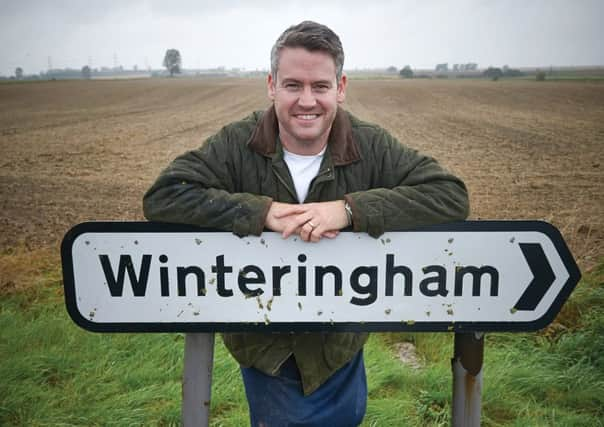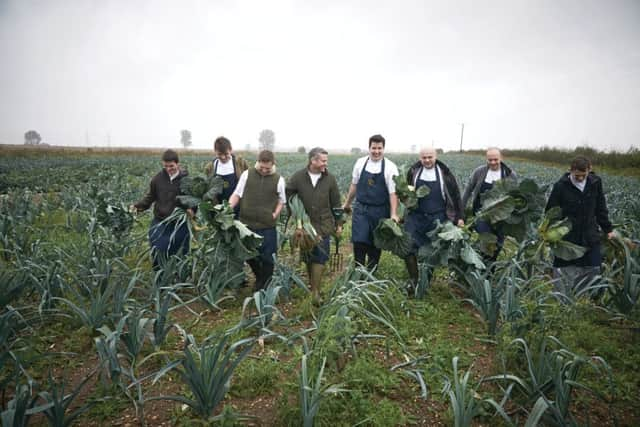Great British Menu chef Colin McGurran on how the recession forced him to go back to basics


But within a week of its recent publication it had already sold a few hundred copies to diners who’d made a pilgrimage to a remote restaurant with rooms on the banks of the Humber. “I only need to sell a thousand and we’ll have covered all our costs,” says the man with his name on the cover. He is Colin McGurran; the restaurant is Winteringham Fields. The book, A Table at The Fields, has been 10 years in the writing and stands as a marker for the man and his philosophy.
Both the man and the restaurant will ring a few bells. He has been slowly building a reputation as a chef with real imagination – think his prize-winning dishes on BBC TV’s Great British Menu, such as the stunning Quail in the Woods (smoke, but no mirrors), which won him a place at the show’s Olympic Banquet in 2012, or Tomato Gazpacho and Garden Salad, which he also did on TV for Red Nose Day, which playfully tweaks nature itself, coming served with a whole “tomato” made from gazpacho mousse coated in glossy tomato gel, pictured below.
Advertisement
Hide AdAdvertisement
Hide AdThe restaurant, in days BC (before Colin), was arguably even more famous; recipient in its time of not one, but two Michelin stars, making it one of the highest rated restaurants in the entire country, outside of London. Rumour has it oil-rich sheiks would fly in for lunch by helicopter; while Elton John was just one paparazzi target spotted there.


In its Michelin heyday, Winteringham was owned and run by chef-patron Germain Schwab and his wife, Annie. Just by chance Colin, without even knowing the restaurant was up for sale, had stopped there for lunch and instantly fallen in love.
“I just knew I had to buy it,” he says. Colin’s wife, Bex, was not so enthusiastic. The couple had just extracted themselves from what they describe as a “nightmare period” running the 45-bedroom Stoneleigh Hotel in Wakefield – a place he says was the epitome of Fawlty Towers (and now converted into flats) – and the birth of their second daughter was imminent.
“The timing couldn’t have been more inappropriate. ‘You aren’t planning on moving us here, are you?’ was Bex’s immediate reaction,” remembers Colin. “But I had a grand plan and nothing was going to sway me,” he says.
Advertisement
Hide AdAdvertisement
Hide AdHe took the keys in August 2005 with a plan of “keeping things simple” and following the existing business model; however, slowly but surely external factors forced a dramatic rethink.


First, one of the two stars went as a result of the ownership change, then, by the time the 2008 guide was published, Winteringham had lost the second, following the departure of head chef Robert Thompson. That year also saw the onset of the Great Recession and a massive slump in trade.
“Suddenly bookings fell through the floor and thinking it might be another Stoneleigh House we thought ‘here we go again’ – but that experience had taught us not to panic,” says Colin.
It led directly to the McGurran’s version of The Good Life. “I’m a firm believer in using local produce – it’s better for the environment, richer in flavour and makes good economic sense,” he says. “So what better way to achieve this than by growing our own vegetables and herbs? And why stop there? Rearing our own animals and poultry would mean we would have complete control of the quality of care, making us absolutely certain that the meat in our dishes would be free range and superior in taste.”
Advertisement
Hide AdAdvertisement
Hide AdHe calls his concept “from field to fork” and with sheep, pigs, chickens, poly tunnels and fields growing herbs, salad crops and vegetables just a stone’s throw from the restaurant, it means, on average, 80 per cent of everything on the restaurant’s menu is home produced, with fish producers (from nearby Grimsby) and local farmers contributing the rest.
“Economic necessity was the catalyst for change,” says Colin. “In 2008 we were spending £50,000 to £60,000 a year on vegetables and the recession meant we couldn’t sustain that. Today that bill is down to £8,000. But more than that, it forced me to rethink our whole food philosophy.
“Before the recession we would order the best of everything without much thought as to costs.”
“Our menus are now determined by our harvest and the animals we rear. I call it our One Mile Menu – simple food done well – but our new style meant you needed to have a lot more confidence as a chef in what you were doing and ensure every little bit of what you were producing was used.”
Advertisement
Hide AdAdvertisement
Hide AdHe describes how the whole team gets involved and how it engenders a feeling of “family” and pride which, in turn, shows through in the quality of food and service. “It has given us such a fantastic quality of life,” he says. “The entire team’s day is divided between tending to the fields and working in the kitchen. All of the brigade are prepared to get their wellies on and pull carrots. We’re lucky to have a truly motivated team who are really passionate about cooking. I think this is because they really know from first-hand experience the full cycle of the produce. You’re less likely to waste food when you know the time and effort that’s gone into producing it.”
Front of house staff, too, are able to talk to customers about the ingredients on the menu with unusual precision and expertise. Winteringham offers seven and nine course tasting menus, where diners are taken on a “journey of understanding” about the restaurant’s ethos, with only the merest tantalising hints given as to what they can expect.
Slowly but surely Colin and Bex found they had weathered the storm and by 2011 were feeling far more confident. It allowed them to embark on a massive programme of investment… a new, purpose-built kitchen, an additional dining room for functions and weddings and new bedrooms in the grounds and close by in the village, as well as refurbishing bedrooms in the original farmhouse.
Colin describes the Winteringham transformation as going from “Victorian style to modern country living” and he shows no sign of slowing down in his ambitions. Just over a year ago he rescued a flood-hit pub, the Hope & Anchor, down the road in South Ferriby, invested half a million pounds in turning it into a gastro pub – a move that has been a huge success.
Advertisement
Hide AdAdvertisement
Hide Ad“We hit 1,500 covers in a week in the summer,” he says, revealing there are now plans to add rooms for those wishing to stay overnight.It offers a different dining experience to Winteringham but one that is still founded on similar principles. “We offer a casual and informal space but with no compromise on quality of food,” he says.
After his first great success on the Great British Menu in 2012 and his follow-up appearances, which saw him create a unique desert for a banquet in St Paul’s Cathedral to mark the 70th anniversary of D-Day (it was a chocolate recreation of the Dickin medal given to animals who served in the war), Colin was inundated with offers to publish his first cookbook.
“But I didn’t want to trot out just another collection of recipes; particularly recipes that didn’t represent who I really am.” he says.
Instead, he held back and began working on ideas that has finally seen the joint publication, between himself and Sheffield-based Meze Publications, of A Table at the Fields. It’s available only via the publishers or from Winteringham Fields and is designed to mark a decade of continuous progress.
Advertisement
Hide AdAdvertisement
Hide AdThere are 68 recipes in total, split across the four seasons, and range from relative simplicity (Apple Mint Jelly) to hugely challenging – the aforementioned Quail In The Woods, which occupies eight pages and takes more than 36 hours to make. “I get asked about this dish most often,” says Colin and he says he wanted to include it as much for an appreciation of the creative processes that went into its development as any expectation that it could be recreated in a domestic kitchen. “I have a whole team behind me, not many have a sous chef on hand at home,” he counsels.
More than anything, he says, he hopes his book inspires people to get creative and cook with a similar ethos. “Getting to know the produce you use every day in the kitchen will encourage you to think about food in a very different way. Our philosophy takes things back to basics and revitalises the notion of seasonal cooking.
“It’s all about using the supermarket less. Obviously not everyone has the means to reap a full harvest, but what you can’t grow yourself we want to embolden you to try and source from as close as possible.
“Most importantly, remember that cooking is not a test, it is one of life’s most pleasurable skills.”
Advertisement
Hide AdAdvertisement
Hide AdAnd what of the future? Colin McGurran seems more relaxed and certain of his aims and ambitions than at any time since I first met him 10 years ago. Feted by his peers – Daniel Clifford describes him as “a true legend” while Tom Aikens says, simply, “he is one of the great chefs in the UK” – he’s long since stopped trying to fathom the workings of Michelin inspectors.
“People always ask us why we haven’t got a star and I don’t know what to tell them. It remains as much a mystery to me as it does to those who ask. I no longer worry about it – my focus is on creating an experience that will live long in the hearts and minds of those who visit us.”
• A Table at The Fields is published by Meze Publishing, priced £25. To order, visit winteringhamfields.co.uk or call the restaurant on 01724 733096.